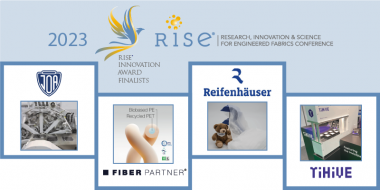RISE® Innovation Award 2023: Four Finalists
INDA, the Association of the Nonwoven Fabrics Industry, announced the finalists that will compete for the RISE® Innovation Award. RISE®, the Research, Innovation & Science for Engineered Fabrics Conference, will take place September 26-27 at Talley Student Union, North Carolina State University, Raleigh, NC.
The finalists who will present their product innovations on Tuesday, September 26th, include:
ESC-8 – The JOA® Electronic Size Change Unit by Curt G. Joa, Inc.
The JOA® ESC-8™ unit allows unprecedented Adult Pant design flexibility with the ability to process nearly limitless combinations of insert and chassis sizes at industry best speeds. Additionally, this technology enables the production of a greener, more sustainable product by eliminating up to 250 tons of material, 5 tons of glue, and 500 tons of greenhouse gas emissions every year.
BicoBio Fiber by Fiberpartner ApS
The BicoBio Fiber is a bicomponent fiber core sheath construction, developed from materials with a low carbon footprint. This fiber is designed to biodegrade in the environments where most plastics are found: landfills and the ocean. The fiber’s BioBased PE is produced from sugar cane and has a negative carbon footprint. The fiber’s recycled PET is GRS certified. PrimaLoft® Bio™, a technology that enables polyester fibers to biodegrade, is utilized in the production of BicoBio Fibers. These fibers can be processed with a variety of nonwoven technologies.
Reifenhäuser Reicofil RF5 XHL by Reifenhäuser REICOFIL GmbH & Co. KG
Reicofil XHL (Extra High Loft) is the game changer for a super soft and drapeable nonwoven offering an incomparable feel the nonwoven market has never seen before. The outstanding soft touch is unique and intended for use in the hygiene sector. XHL focuses on low basis weight and high thickness with the best visual appearance. The high performance and efficient use of raw materials and energy ensure cost-effectiveness and environmentally-friendly production.
SAPMonit by TiHiVE
TiHive’s game-changing innovation, SAPMonit – a visionary French technology breakthrough – inspects millions of diapers weekly. SAPMonit delivers lightning-speed inline inspection of Super Absorbents weight and distribution, optimizes resources, detects flaws, and accelerates R&D. SAPMonit utilizes advanced see-through cameras, high-speed vision algorithms, and secure cloud integration, revolutionizing industry norms. SAPMonit has great potential for sustainability, cost reduction, and enhanced customer satisfaction.
The RISE Innovation Award winner will be announced Wednesday afternoon, September 27th.











